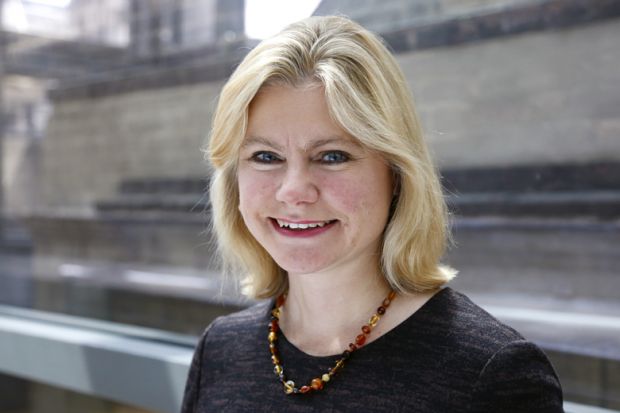Justine Greening has attacked Labour’s pledge to abolish tuition fees in England as threatening the chances of poorer students making it to university, pointing to Scotland’s fee-free experience as an example.
The UK’s education secretary tackled the issue of tuition fees when she spoke at a Sutton Trust event on social mobility on 12 July, as the Conservative government faced growing political pressure over the effects of the £9,250 system.
Following the impact that the Labour Party achieved in the general election with its policy to abolish fees and fund students and universities via public spending, Damian Green, the first secretary of state, has suggested that there should be a “national debate” on tuition fees – although government sources have said that his comments did not herald any change in approach.
A recent report by the Institute for Fiscal Studies has increased the pressure on the government, highlighting the regressive impact of the abolition of maintenance grants for poorer students and the freezing of the £21,000 repayment threshold – changes that were made after the trebling of fees in 2012.
After her speech, Times Higher Education asked Ms Greening whether she agreed with some of her Conservative colleagues who say that elements of the current system are unfair and whether the Department for Education would review the system.
“On access to higher education: there’s obviously a debate, I recognise that,” she replied. Ms Greening described herself as the “first person in my family to be able to go to university, and that matters to me a huge amount”.
She went on to argue that Labour’s plans for a publicly funded system would mean the return of student number controls – which have been fully removed since 2015-16.
“The debate that we’ve had has really revolved around what’s the best way to enable access to our university system. I think we’ve seen a debate between whether that’s no fees or no cap,” Ms Greening said.
“Well, we have no fees in Scotland. It means that they have to have a [student number] cap. And when you bring a cap in, it means fewer students with the chance to go to university.
“In fact, about one in four, one in five, would-be students in Scotland don’t even get an offer of a university place.
“So we know that when there are fewer places at university, who gets them? Well, it tends to be the students who are doing better in our schools system, and that tends to be students from better-off families.”
Ms Greening continued: “The evidence is extremely clear comparing no fees in Scotland, no cap in England – it’s in England where disadvantaged young people get the chance to go to university.
“I really do feel that the Labour Party should come clean to young people and be more upfront to them about the consequences of its no-fees policy.”
The education secretary also criticised Labour for indicating that it wants to write off or reduce the debt of existing graduates. Although no such policy appeared in Labour’s manifesto, it was referred to by the party’s leader, Jeremy Corbyn, in an interview with the NME in the lead-up to the election.
“[Labour] should be frank with young people that what they said in the run-up to the election about effectively writing off student debt was a promise that was a false promise,” said Ms Greening. “And they should be honest with young people about that.”
Register to continue
Why register?
- Registration is free and only takes a moment
- Once registered, you can read 3 articles a month
- Sign up for our newsletter
Subscribe
Or subscribe for unlimited access to:
- Unlimited access to news, views, insights & reviews
- Digital editions
- Digital access to THE’s university and college rankings analysis
Already registered or a current subscriber? Login








